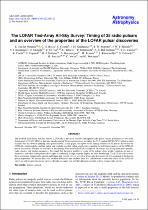The lofar tied-array all-sky survey: Timing of 35 radio pulsars and an overview of the properties of the lofar pulsar discoveries
Abstract
The LOFAR Tied-Array All-Sky Survey (LOTAAS) is the most sensitive untargeted radio pulsar survey performed at low radio
frequencies (119−151 MHz) to date and has discovered 76 new radio pulsars, including the 23.5-s pulsar J0250+5854, which up until
recently was the slowest spinning radio pulsar known. In this paper, we report on the timing solutions of 35 pulsars discovered by
LOTAAS, which include a nulling pulsar and a mildly recycled pulsar, and thereby complete the full timing analysis of the LOTAAS
pulsar discoveries. We give an overview of the findings from the full LOTAAS sample of 76 pulsars, discussing their pulse profiles,
radio spectra, and timing parameters. We found that the pulse profiles of some of the pulsars show profile variations in time or
frequency, and while some pulsars show signs of scattering, a large majority display no pulse broadening. The LOTAAS discoveries
have on average steeper radio spectra and longer spin periods (1.4×), as well as lower spin-down rates (3.1×) compared to the known
pulsar population. We discuss the cause of these differences and attribute them to a combination of selection effects of the LOTAAS
survey as well as previous pulsar surveys, though we cannot rule out that older pulsars tend to have steeper radio spectra.

